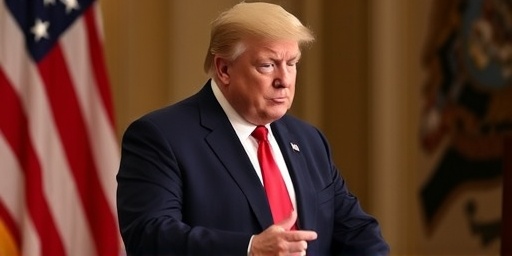In a stark blow to the nation’s veteran entrepreneurs, a surge of federal contract cancellations orchestrated by the Trump administration has triggered widespread layoffs and financial instability for Veteran-owned businesses. Over the past six months, more than 2,500 contracts worth an estimated $1.2 billion have been axed, with the Department of Veterans Affairs (VA) leading the charge in efforts to curb government waste. This disproportionate impact on small businesses run by military veterans—many of whom rely heavily on federal contracts for their survival—has ignited fears of a ripple effect across the sector, potentially derailing the economic reintegration promises made to those who served.
The cuts, justified by administration officials as necessary fiscal reforms, have left companies scrambling. Veteran-owned businesses, which number over 400,000 nationwide and contribute billions to the economy, were supposed to benefit from preferential federal contracting under programs like the Service-Disabled Veteran-Owned Small Business (SDVOSB) initiative. Instead, they’re now facing an uncertain future, with some owners reporting payroll shortfalls that could force closures within months.
VA’s Aggressive Contract Purge Disrupts Veteran Supply Chains
The Department of Veterans Affairs has been at the epicenter of this upheaval, terminating contracts that once provided steady revenue streams for Veteran-owned businesses specializing in everything from medical supplies to IT services. According to a recent report from the Small Business Administration (SBA), VA-related cancellations alone account for 40% of the total federal cuts affecting veteran enterprises this fiscal year. This aggressive purge stems from a broader Trump administration directive issued in early 2023, mandating agencies to review and eliminate ‘non-essential’ expenditures amid rising national debt concerns.
One affected company, Patriot Logistics Solutions—a veteran-owned small business based in Virginia—lost a $5 million VA contract for transportation services overnight. “We built this company on the promise of federal support for vets like me,” said CEO and Army veteran Mark Thompson in an exclusive interview. “Now, we’re laying off 25 employees, many of whom are fellow veterans. It’s a betrayal of the very system that’s supposed to honor our service.” Thompson’s firm, which employs 50 people and has been certified as an SDVOSB since 2018, now faces bankruptcy proceedings if alternative funding isn’t secured soon.
Statistics paint a grim picture: The National Veteran Business Development Council (NVBDC) estimates that 15% of veteran-owned businesses dependent on federal contracts have already implemented workforce reductions, with projections of up to 30% more by year’s end. These cuts aren’t isolated; they cascade through supply chains, hitting subcontractors and local economies in veteran-heavy states like Texas, California, and Florida, where such businesses cluster around military bases.
Trump Administration’s Waste-Reduction Push Faces Veteran Backlash
Under the Trump administration’s renewed focus on streamlining government spending, federal agencies were instructed to identify and cancel contracts deemed inefficient or redundant. Proponents, including White House economic advisors, argue that this initiative has already saved taxpayers over $10 billion annually by targeting bloated procurement processes. However, critics, particularly within the veteran community, contend that the policy overlooks the unique vulnerabilities of small businesses owned by former service members.
“The administration’s one-size-fits-all approach to waste reduction is shortsighted,” stated Sarah Jenkins, policy director at the Veterans Entrepreneurship Program. “Veteran-owned businesses aren’t just vendors; they’re a cornerstone of the administration’s own ‘Buy American’ agenda. Slashing their federal contracts undermines the very patriotic ethos the president champions.” Jenkins highlighted data from the Federal Procurement Data System showing that veteran-owned firms secured just 5.8% of eligible federal contracts in 2022, down from 7.2% the previous year—a decline exacerbated by these cancellations.
The backlash has been vocal. At a recent congressional hearing, Representative Nancy Mace (R-SC), a veteran herself, grilled VA Secretary Denis McDonough on the human cost of the cuts. “These aren’t faceless corporations; these are men and women who fought for this country and are now fighting to keep their doors open,” Mace remarked. In response, McDonough defended the moves, citing internal audits that revealed up to 20% overlap in VA procurement, but promised a review of impacts on small businesses. Still, with the administration’s fiscal year budget proposals emphasizing further austerity, relief seems distant.
Beyond the VA, other agencies like the Department of Defense (DoD) have followed suit, canceling 800 contracts valued at $450 million that supported veteran-owned suppliers for military logistics. This has amplified the strain, as many of these small businesses juggle multiple federal streams. The SBA reports that the average veteran-owned business relies on federal contracts for 35% of its revenue, far higher than the 20% average for non-veteran small businesses.
Veteran Entrepreneurs Share Stories of Layoffs and Desperation
From the rolling hills of rural Ohio to the bustling ports of San Diego, veteran-owned businesses are grappling with the fallout. Take Valor Tech Innovations, a California-based firm founded by Marine Corps veteran Lisa Ramirez. Specializing in cybersecurity for federal health systems, the company saw its primary VA contract evaporate in March, leading to the layoff of 18 staffers—12 of whom were veterans transitioning from active duty.
“I served two tours in Iraq, and this feels like coming home to a ambush,” Ramirez told reporters. “We invested everything into complying with federal set-aside programs, only to have the rug pulled out. Now, we’re dipping into personal savings just to make payroll.” Ramirez’s plight is emblematic; a survey by the NVBDC of 1,200 veteran business owners revealed that 62% are considering pivoting to private sector clients, but 45% doubt their ability to do so without significant loans—loans that banks are increasingly reluctant to issue amid economic uncertainty.
In Texas, where veteran-owned businesses employ over 100,000 people, the cuts have hit particularly hard. Rancher and Air Force retiree Tom Ellis, owner of a supply chain firm serving DoD bases, described a domino effect: “Lost the federal contract, then our biggest client—a defense contractor—followed suit. We’ve cut hours for everyone, and morale is in the toilet.” Ellis’s story underscores a broader trend: The U.S. Chamber of Commerce notes a 12% uptick in small business loan defaults among veteran-owned enterprises since the cuts began.
Personal testimonies like these are fueling grassroots movements. Online forums and veteran networks are buzzing with calls for unity, with groups like the National Association of Veteran-Owned Businesses organizing virtual town halls to share survival strategies, from grant applications to crowdfunding campaigns. Yet, the emotional toll is evident; mental health experts warn of rising stress levels, echoing the high PTSD rates already prevalent among veterans.
Small Business Advocates Demand Federal Intervention
As the scope of the damage widens, advocacy groups are ramping up pressure on Capitol Hill for safeguards. The SBA’s Office of Veterans Business Development has launched an emergency task force to assess the cuts’ long-term effects, while lobbying for reinstated set-aside quotas. “Federal contracts are a lifeline for veteran-owned businesses, especially in a post-pandemic economy,” said SBA Administrator Isabella Casillas Guzman. “We can’t let efficiency gains come at the expense of those who’ve sacrificed the most.”
Lawmakers are responding with proposed legislation. The Veteran Small Business Protection Act, introduced by a bipartisan group in the House, aims to mandate impact assessments before any future contract terminations affecting SDVOSBs. Supporters cite precedents from the Obama era, when similar protections helped veteran businesses weather sequestration cuts. Meanwhile, the Trump administration has signaled openness to tweaks, with a spokesperson noting ongoing consultations with veteran stakeholders to ‘balance fiscal responsibility with support for heroes.’
Economically, the stakes are high. Veteran-owned businesses generate $1.2 trillion in annual sales and support 5.8 million jobs, per Census Bureau data. Disruptions here could slow national recovery efforts, particularly in defense and healthcare sectors reliant on diverse suppliers. Experts like Dr. Emily Harper from Georgetown University’s McDonough School of Business warn that without intervention, we could see a 10-15% contraction in the veteran entrepreneurship sector by 2025, exacerbating inequality for minority and women veterans who own 25% of such firms.
Looking ahead, the path forward hinges on policy pivots. Veteran organizations are optimistic about upcoming budget negotiations, urging the inclusion of ‘veteran carve-outs’ in federal spending bills. Private sector partnerships, such as those with Walmart and Amazon’s veteran supplier programs, offer glimmers of hope, but they can’t fully replace the scale of federal contracts. As one entrepreneur put it, “We’ve adapted to war zones; we’ll adapt to this. But Washington needs to step up before more dreams are lost.” With midterm elections looming, the issue could become a flashpoint, pressuring the Trump administration to reconcile its waste-reduction goals with commitments to America’s veterans.








